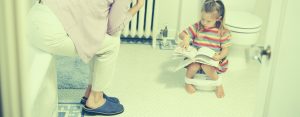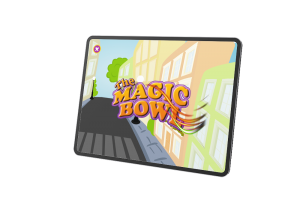
Preliminary Bowel Cleanout: The First Step to Behavioral Therapy
Preliminary Bowel Cleanout: The First Step to Behavioral Therapy Pediatric constipation is more widely common among children than many parents think, and it can be
The process of toilet training has a potent influence on the development of your child’s personality. For him or her, it is like an initiation into the world of adults, graduation. Whether or not they can use the toilet impresses their self-esteem, self-image, and sense of control. Thus, during toilet training, parents’ behavior must root in warmth, patience, and understanding. It should not cause any conflict for the child in such a sensitive period. All these qualities will bolster the child’s trust and security in you and improve her confidence and self-image. An incorrect approach can compromise the kid’s developing personality and delay the toilet training process. This can lead to a range of problems, many of which I have highlighted in my book.
To avoid complications and minimize problems as much as possible, I will mention some common issues encountered during toilet training. If I had to sum up this article’s message in one sentence, it would be this:
If you stay true to that, you will spare yourself and your child many complications, problems, and hassles. The child, going diaper-free, is transforming into an essential aspect of his life, a central habit, one that has impressed on her since birth. You should ask the child suddenly, living harmoniously with her “built-in” toilet, not to poop anywhere, anytime. Ask them to stick to one place, and a strange-looking one as well: the toilet. It is like asking us to stop at the green light, drive off at the red one instead, or drive on the left-hand side of the road instead of on the right.
Transitioning to a new habit is difficult for anybody. We might know what we need to do, we might even understand why we need to do it; we repeatedly cannot change things such as eating or smoking habits. It is indeed a lot harder for children.
However, everyone deals with the challenge differently. Some children pick up the apparent hints surrounding the subject. They may notice their parents, siblings, and friends going to the bathroom to poop, and they may feel the urge to do like them. For them, pooping in the toilet instead of the diaper is just a simple transition. For many other kids, however, it is far from simple. Those kids usually place a great deal of dependence on the diaper. They feel safe with it, and so the idea of abandoning it becomes alarming and threatening.
On the other hand, parents need to train their children to live up to society’s standards. Their role in this is also complex and challenging. Toilet training is an essential social norm, and they impart it to their children. That is why you place new demands on your kids. By default, you invest in this process. Therefore, put your irritation, frustration aside, and aim to create a harmonious and supportive atmosphere for your child instead. When such an environment is there, it immensely contributes to a positive image in your child’s eyes.
Parents can be authoritative while still being supportive, protective, and understanding. If that environment is lacking, however, the image-formation is negatively affected. If there is conflict and irritation rather than harmony and ease, the child develops doubt and shame rather than confidence and security. That is why you need to follow your own child’s timing and pace rather than society in toilet training. It reflects in several areas whether your child is ready to go diaper-free.
Your child can identify physical signals related to elimination, such as pressure on the bladder or in the bowels. They develop their gross and fine motor skills, as reflected in their ability to walk to the bathroom, clamber onto the trainer seat, remove and put on their own clothing, and deal with buttons, Velcro, and so on. Emotionally, your child develops the need to stop using the diapers and to imitate the adults around. They show an urge for achievement and independence. Cognitively, the child shows the capacity to understand, express, and communicate.
Most researchers agree that most children will be ready between 18 months and 2½ years old in all aspects with other countries and ethnic groups; children can be diaper-free even earlier. Sometimes at 9 months of age, such as in Russia and Ethiopia, for instance. However, training the kids at an earlier age needs the right approach and an appropriate level of readiness on the parents’ part.
The approach and readiness of the parents determine both the shape the training process takes and how successful it ends up being. It is within their hands, whether it ends up straightforward and harmonious or filled with frustration and anger. To ensure maximum success, parents must embark on the toilet training process only when ready, available, and armed with patience. Several principles confirm a compelling and brief experience in that regard, all of which I stated in my book.
The most important of those is accommodation, patience, and encouragement. The development process of our children is full of milestones and skills that need to be acquired—toilet training is one of them. While for other areas of development such as walking, talking, and growing, there are norms, criteria, and methods of support and evaluation. There is none when it comes to toilet training. When we stint or delay other areas of development (children who walk or talk late or have a slow growth rate), we usually show empathy, understanding, and encouragement.
It is unthinkable that we blame the children. We demand them to try harder or show them our disappointment when their progress in those skills and milestones does not match the norm. Sadly, this does not happen with toilet training. We might understand when our children are having problems walking or talking. However, we dislike it as much when our children occasionally soil themselves in their underwear, in the car, or on the living-room couch. We expect them to do better, and we think they may do it on purpose, as a power play or an attempt for control.
However, we need to maintain an awareness of the situation and understand that it is beyond the child’s control. Instead of placing it on their tiny shoulders, we need to depend on our intelligence, planning, and thinking.

Preliminary Bowel Cleanout: The First Step to Behavioral Therapy Pediatric constipation is more widely common among children than many parents think, and it can be

Encopresis and Constipation in Children Soiling, stool soiling, or fecal soiling refers to the leakage of stool that a child cannot control. This condition happens

Frequent Soiling: Causes and Treatment Frequent soiling, fecal incontinence, or encopresis is a condition when a child, typically between 5 and 9 years of age,

Speed up the process of progressing from infant diapers to toilet chairs or toilet seats with The Magic Bowl App.

The Magic Bowl – potty training made easy Dr. Baruch Kushnir turns potty training into a fun, effective, and most importantly, short experience. Order Now

Encopresis – you can beat it! Game-changing solutions for Toilet Anxiety, Soiling, and Constipation in Children Order Now About the book How to eliminate poop